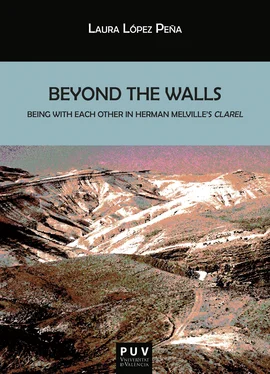Laura López Peña - Beyond the Walls.
Здесь есть возможность читать онлайн «Laura López Peña - Beyond the Walls.» — ознакомительный отрывок электронной книги совершенно бесплатно, а после прочтения отрывка купить полную версию. В некоторых случаях можно слушать аудио, скачать через торрент в формате fb2 и присутствует краткое содержание. Жанр: unrecognised, на английском языке. Описание произведения, (предисловие) а так же отзывы посетителей доступны на портале библиотеки ЛибКат.
- Название:Beyond the Walls.
- Автор:
- Жанр:
- Год:неизвестен
- ISBN:нет данных
- Рейтинг книги:3 / 5. Голосов: 1
-
Избранное:Добавить в избранное
- Отзывы:
-
Ваша оценка:
- 60
- 1
- 2
- 3
- 4
- 5
Beyond the Walls.: краткое содержание, описание и аннотация
Предлагаем к чтению аннотацию, описание, краткое содержание или предисловие (зависит от того, что написал сам автор книги «Beyond the Walls.»). Если вы не нашли необходимую информацию о книге — напишите в комментариях, мы постараемся отыскать её.
Beyond the Walls. — читать онлайн ознакомительный отрывок
Ниже представлен текст книги, разбитый по страницам. Система сохранения места последней прочитанной страницы, позволяет с удобством читать онлайн бесплатно книгу «Beyond the Walls.», без необходимости каждый раз заново искать на чём Вы остановились. Поставьте закладку, и сможете в любой момент перейти на страницу, на которой закончили чтение.
Интервал:
Закладка:
A number of studies have analyzed Melville’s relationship with religion and the influence of the Bible on his works. 5 Nonetheless, Melville’s religiosity, if any, continues to inspire much debate and disagreement. As Roland A. Sherrill has remarked, Melville has been named “a mystic, a savvy kind of Calvinist, a Christian existentialist, a primitive pagan, a Romantic theologian, a Protestant prophet, an atheist, and a nihilist” (481). Hilton Obenzinger’s consideration of Melville as an agnostic (“Wicked” 195), also shared by Robert Milder ( Exiled 219), is closer to this volume’s views on the author’s religiosity and informing to its interpretation of Clarel . And, yet, it is Nathaniel Hawthorne’s description of Melville after the two friends met in Liverpool when the would-be author of Clarel was on his way to Palestine in November 1856, which may be said to capture one of the most accurate portrayals of Melville’s questioning nature:
It is strange how he persists—and has persisted ever since I knew him, and probably long before—in wandering to-and fro over these deserts, as dismal and monotonous as the sand hills amid which we were sitting. He can neither believe, nor be comfortable in his unbelief; and he is too honest and courageous not to try to do one or the other. If he were a religious man, he would be one of the most truly religious and reverential ; he has a very high and noble nature, and better worth immortality than most of us. (qtd. in Bezanson “Historical” 511)
Melville’s attitude toward God and religion, belief and unbelief, faith and dogma, was a restless one throughout the author’s life, not exempt from anxiety and grief. Born to a Calvinist mother and a Unitarian father, and reared in a devout Calvinist family, Melville received a Calvinist education and was raised as a member of the Dutch Reformed Church since his earliest childhood, being a usual attendant at church with his family. The young Melville, however, would soon find in travel and in the contact with human beings and societies who were different to his a way to de-transcendentalize the cultural and religious “Truths” into which he had been indoctrinated since childhood. In particular, it was his experiences at sea, first in merchant ships and later as a common sailor on board whalers, that exposed him to a representative plurality of human beings, cultural practices, and religious beliefs by peoples whom his culture had taught him to consider “savages”. These voyages would also bring him face to face with the violent practices Christian missionaries were carrying out in the Pacific, which Melville condemned in his first two bestselling novels Typee and Omoo . This way, early in life would Melville learn the no-line between savagery and civilization, as well as the hypocrisy of Christian morality and the failure of Christians to be Christians. He would also conceive different religious thinking parameters as equivalent to one another in their different interpretations of human beings’ relationship to God. As Hilton Obenzinger has remarked, in Clarel “[a]ll religions are explored with a clear sense of their underlying unity, that in their essence they all attempt to address the same ultimate questions, recognize the common bond of suffering, and worship the divine” (“Wicked” 191). As a matter of fact, Melville’s views on religion and humanity point beyond a mere cosmopolitan system of (religious) equivalences: the author challenges dogma and transcendental Truths as much as he problematizes nation/ality, race, or culture, and puts forward fluid conceptions of sexuality. While the 1876 Clarel holds a great deal of the (non-)religious views professed by the thirty-year-old Melville of Mardi or Mody-Dick , this poem also conveys a more markedly disillusioned, even nihilistic, viewpoint. Quoting Obenzinger: Clarel “does not find that any one faith, including Christianity, can resolve uncertainty, relieve the burden of doubt. The spiritual exercise of considering each one—as rich and beautiful as the dialogues may be—ends with no revelation. The poem, as Charles Olson observes, is a ‘rosary of doubt’ (99)” (“Wicked” 191). Also indicative of spiritual barrenness is the portrayal of the Holy Land as a land of desolation where no God is present (not even hidden, as Stan Goldman claims). This problematization of religious Truths, which includes even the ultimate religious Truth (i.e. God), is constant in the author’s literary career.
Also constant is Melville’s condemnation of religious fundamentalism of any kind as leading to one-sidedness, intolerance, and violence. In Clarel , Melville analyzes religious mania, particularly through Nathan, a representative of spiritual doubt who eventually clings to religious fervor in the form of Zionism, and also through Nehemiah, in connection to millennialist movements. Above all, the poem foregrounds the religious confrontations and intolerances between different major religious communities in Jerusalem/Palestine. This condemnation of religious fundamentalism is not exclusive to Clarel , but is already explicit in Melville’s earlier works. The 1851 Moby-Dick constitutes a good example:
I have no objection to any person’s religion, be it what it may, so long as that person does not kill or insult any other person, because that other person don’t believe it also. But when a man’s religion becomes really frantic; when it is a positive torment to him; and, in fine, makes this earth of ours an uncomfortable inn to lodge in; then I think it high time to take that individual aside and argue the point with him. (92)
Melville’s works predicate religious tolerance while exposing a conception of the equivalential relationship of different religious systems of interpretation of reality and God. In Moby-Dick , for instance, Melville makes Ishmael an example of religious sympathy which transcends mere tolerance, as he not only respects Queequeg and leaves him to his beliefs, but actually accompanies his new friend in his adoration of the little idol Yojo. Ishmael justifies this gesture through an ironic reasoning which proclaims that a “good Christian; born and bred in the bosom of the infallible Presbyterian Church” (63), like himself, must paradoxically “turn idolator” in order to follow God’s dictates of universal fraternal love:
Do you suppose now, Ishmael, that the magnanimous God of heaven and earth—pagans and all included—can possibly be jealous of an insignificant bit of black wood? Impossible! But what is worship?—to do the will of God— that is worship. And what is the will of God?—to do to my fellow man what I would have my fellow man to do to me— that is the will of God. Now, Queequeg is my fellow man. And what do I wish that this Queequeg would do to me? Why, unite with me in my particular Presbyterian form of worship. Consequently, I must then unite with him in his; ergo, I must turn idolator. (63)
The religious opinions Ishmael expresses in Moby-Dick are not endorsed from a cultural supremacist point of view: he does not regard other religious interpretations as deviant from the Christian “Truth” or as wrong. Instead, Ishmael contemplates religion as a culturally molded human fabrication to give explanation to the inexplicable; he conceives each religious construct in relation to others that have been differently articulated by different peoples and at different times. Ishmael understands the importance of religious belief to those who profess it, yet detaches himself from dogma and feels certainly estranged from religious practices even if he jokingly admits that “I cherish the greatest respect toward everybody’s religious obligations, never mind how comical, and could not find it in my heart to undervalue even a congregation of ants worshipping a toad-stool” ( Moby-Dick 89). Not only Queequeg’s veneration of Yojo in Moby-Dick , but also Mardians’ polytheistic adoration in Mardi , and Catholics’ worshipping of Jesus’s tomb and the Holy Sepulcher, Jews’ adoration of the Western Wall, or geologists’ adoration of stones and fossils, in Clarel , constitute equivalent examples of such “congregation[s] of ants” at different stages of Melville’s literary production. On the other hand, a respect for sincere believers who can find peace in their different forms of faith is also characteristic of Clarel . As Hilton Obenzinger has noted, “[d]espite this sense of Deus abscondus , Clarel and the narrator regard heartfelt believers with great respect, no matter the tradition: Abdon, the black Jew from India, Djalea, the stoic Druze guide, and Catholic priests and Mar Saba monks are all comfortable and at peace in their faiths. But the other seekers are more troubled or troubling” (“Wicked” 192).
Читать дальшеИнтервал:
Закладка:
Похожие книги на «Beyond the Walls.»
Представляем Вашему вниманию похожие книги на «Beyond the Walls.» списком для выбора. Мы отобрали схожую по названию и смыслу литературу в надежде предоставить читателям больше вариантов отыскать новые, интересные, ещё непрочитанные произведения.
Обсуждение, отзывы о книге «Beyond the Walls.» и просто собственные мнения читателей. Оставьте ваши комментарии, напишите, что Вы думаете о произведении, его смысле или главных героях. Укажите что конкретно понравилось, а что нет, и почему Вы так считаете.










